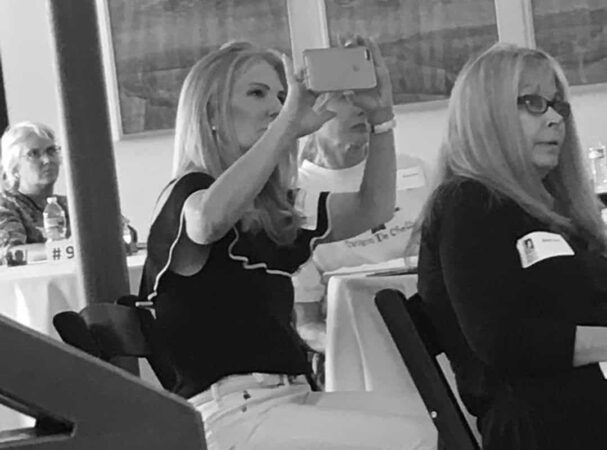When someone asks you how you are doing, do you often say, “I’m really busy!”?
I am taking a firmer stand against busyness because I don’t want to be known as “busy.” I want to be known for other things, like being free.
Why do we proudly tell people we are busy? Some of it is the pace of life and work and families—there is a lot to keep us busy—so some busyness is realistic, but there are other things going on, too.
Busy as a Badge of Honor
We often say we are busy as a way of justifying our value. Whether what we are doing is meaningful or not is another question entirely. We don’t want anyone to think we are slacking off. So saying “I’m busy” can be code for, “Don’t bother me. I’m being productive and don’t need more to do.”
As a consultant, I was taught that saying I was busy was tantamount to saying “I am doing well. Clients value me.” Not being busy enough can be scary. It can lead you to question your basic value. So the busyness habit is fueled by fear. The busier we get, however, the more time-starved and stressed we become. If we try to relax or simply hang out with friends, we worry that we are wasting time.
Busy as a Social Disease
In many fields and organizations, the unstated value is that everyone needs to be moving quickly. This can be enshrined in mission statements: “We are always responsive to clients.” But if everyone is acting with a sense of urgency, it can feed on itself.
Many of my client organizations catapult beyond responsive into frenetic. Everyone feels the need to race, whether or not they know where they are going. When everyone around us is running, our mirror neurons pick it up, and we start running, too.
With email and instant messaging, we spend our days ping-ponging off each other. Taking care of the endless small things—errands and paperwork—is what Georgetown University Professor Cal Newport calls “shallow work.” It creates little value compared to the reflection or “deep work” that enables us to recharge, innovate, and change the game.
Busy as a Distraction From Feeling
If we stop the activity and tune in to what we are feeling, it can be scary—or, at least, we think it will be. We may sense some “dis-ease” or restlessness, and we don’t really want to feel or explore beyond that. We worry we might do something impulsive, like quit our jobs or be consumed by depression. So we keep ourselves distracted to avoid feeling. However, if we actually made space for our feelings, they’d rarely take over. Feelings simply want to be heard.
If we are too busy doing, our feelings can get stuck. Our feelings will make us pay attention. They can make us sick or lead us to act out as way of getting noticed. I have seen many leaders be fired because of bad behavior driven by unacknowledged frustration.
Realistically Busy
There is absolutely a lot to do—more than any of us can handle. Many of us are doing multiple jobs and continually asked to do more with less. Added to this are the pressures of the holiday season and year-end deadlines. Does it ever stop? Yes. We can choose to live and work differently.
Seven Tips for Better Time Management
You don’t have to accept being busy. If you are tired of being busy, use that motivation to kick the habit. Here are some suggestions for how to do it.
1. Prioritize ruthlessly.
Not every idea is important or needs to be acted on. We must make hard decisions and say no more often. That means facing disappointment in ourselves and others.
We can reflect on our core values and purpose, and allow those to guide us. What motivates us? What do we really want to achieve? These are big questions that are not amenable to quick answers. We need time and space to percolate on them, which means setting limits and blocking out time.
2. Stop multitasking and decide to be in the moment.
The faster we go, the more likely we are to try to do two things at once. We delude ourselves into thinking that multitasking is efficient, when in fact it consistently takes us 40% longer and causes twice as many mistakes.
3. Be crystal clear about your role.
Once you make time to reflect, think about what your job really is. If you are a leader or an entrepreneur, you are there to think, not to race. Your job is to create, anticipate, organize, develop, and facilitate.
4. Manage technology.
Phones enable us to work at any hour and all the time, but that doesn’t mean you should. Set limits on when you check email so that you are able to think. Don’t check email first thing in the morning (your most creative time) or as the last task of the day (why focus your dreams on other people’s to-do lists?). If you don’t set limits on messaging and social media, your attention and time will be shredded.
5. Manage your calendar.
Your calendar makes you think in discrete blocks of time. It doesn’t take into account the time you need in between appointments (to get places, use the bathroom, or plan for your next meeting). Instead of scheduling back-to-back meetings, schedule 45- or 25-minute meetings. Then hold the line and wrap things up so that you have time to breathe. Manage your calendar instead of letting it manage you.
6. Ask for help.
If you try to go it alone, you will fail. Being mindful and less busy is a team sport, not an individual endeavor. Delegate or outsource where possible. Negotiate realistic expectations. Refocus your priorities so that you can spend more time thinking instead of chasing low-priority items.
7. Fill your tank.
Busyness is tiring. Build up your energy by taking care of the three pillars: exercise, diet, and sleep—with the latter being the most important.
The research is clear that spending time outside and in nature is one of the best ways to recharge. Make sure you feed your soul with creative activities outside of the studio: reading for fun, going to concerts, or visiting your favorite museum.
Keep Busyness at Bay
Whatever you do, don’t make your action plan turn into more busyness. This process is about decluttering your life, not adding more “to-do’s.” Make one small change at a time and be patient with yourself. Enjoy your freedom!
Additional Reading
- The Tao of Pooh, by Benjamin Hoff
- MindShifting: Focus for Performance, by Joshua Ehrlich
- Deep Work, by Cal Newport







